David S. Ward's shooting script for The Sting makes it look so easy. But, a lot of directors say they hate scenes with card games.
There's the continuity issues. Cards need to be in right positions and chips—the chips!—need to be stacked just so and remain that way from camera set-up to camera set-up. Not just in the "pot" but also individual's piles of chips. And the set-ups guarantee that you're always going to be looking at the back of someone's head or around somebody's shoulders out of focus in the foreground. So, unless you choose the "Julia-Child-cooking-show" of an overhead camera looking down—"The Instagram dinner plate shot?"—there's no way for everybody to be in the frame.
Then, there's the rules, the rituals (a good site explaining poker can be found here)* that have to be done in order, but are usually broken up in parts, all requiring a different camera angle, and the actors to be in the same approximate body language each time. It's a nightmare of continuity issues just waiting to be mentioned in the "Goofs" portion of your IMDB page.
The big one here is that Ward wrote a script for a game of "Straight Poker" (which has no drawing of cards after the initial bet), where what they're playing in the scene is "Draw Poker" (where once you've bought in, you can switch out cards to be dealt new ones). This caused all sorts of issues when laying out the scene with the script. Hopefully, it's not too confusing—I tend to favor what's "on the screen" to what was scripted.
Also, you can write a poker game on the page. Easy enough. You can eeven describe strategy and what the person is feeling. Ward did it in his script. But, men sitting around a table throwing cards and chips is just not an exciting visual in a visual medium. You have to add something to it, and that usually comes down to personality and how un-poker-like the faces of the participants are.
Here, you have five guys and the conductor-"bank" all crowded in a little room playing a game that's supposed to be "hush-hush". In Ward's script, the conductor, Clemmons, intoduces Gondorff's alias "Mr. Shaw" to the poker players:
Mr. Shaw is a bookmaker from Chicago.
Mr. Shaw, meet Mr. Clayton from Pittsburgh,
Mr. Shaw, meet Mr. Clayton from Pittsburgh,
Mr. Jameson, Chicago,
Mr. Lonnegan, New York, and
Mr. Lombard, Philadelphia.
Mr. Lonnegan, New York, and
Mr. Lombard, Philadelphia.
The only guys we care about are Gondorff's "Shaw" and Lonnegan, the villain of the piece. But, Lonnegan cares what Mr's. Clayton, Jameson, and Lombard think. It's his game, his reputation, and his humiliation if he lets this "Mr. Shaw" jack-ass drunken bookie win at the game. Shaw treats everybody like a punching bag, is a sore loser and a horrible winner and nobody likes him. Especially Lonnegan.
But, we keep going back to "the other guys," especially Jameson and Clayton for reaction shots and reaction shots of Lonnegan reacting to their reactions. They're important to the psychology of the game, even if they play no part in it.
And Paul Newman gets to fill in some stage business by having Gondorff
constantly looking over his shoulder to see if anybody's spying his
cards (Newman does lots of business while Shaw does everything with his eyes). But, they're "small potatoes" in the scene, though they play a part.
The guy most people remember and who does a lot of heavy lifting in this scene is "Lloyd," Lonnegan's bodyguard and deck-"cooler," who stacks a deck for Lonnegan to switch after their "little break." Director Hill cuts back to him a lot, mostly because the guy playing Lloyd—character actor Charles Dierkop (he of the perpetually flattened nose)—is hard to miss looking over Paul Newman's shoulder reacting to the game. Inadvertently, he becomes the center of the scene, because of everybody in the room, he has the most to lose. He's the guy who stacked the deck, takes pride in his work, and is left genuinely berieved at how things turn out ("Did I mess up? I don't think I did! But, the cards are different and the boss who was proud of me a couple minutes ago is pissed at me now!"). Most importantly, he's "the capper" for getting out of the scene on a light note.
It's not there in the script. It looked so easy!
The Tale: Small-time grifter Johnny Hooker (Robert Redford) is after gambling gangster Doyle Lonnegan (Robert Shaw) for the murder of his pal, Luther Coleman. Luther had once advised Hooker to seek out Chicago con man Henry Gondorff (Paul Newman) and Hooker, on the run from the law and Lonnegan, leaves Joliet for the Big City to learn "The Big Con" in an effort to take Lonnegan down. To finance the grift, Gondorff books passage on the 20the Century Limited as a bookie named "Shaw" and talks his way into one of Lonnergan's high-stakes poker games.
What Lonnegan doesn't know is that, earlier, he'd had his wallet "lifted" by another member of Gondorff's gang.
You're up, kid.
The game plays out differently in writer David Ward's script. Where it matched the finished product, I kept it. If something was taken out, I've done a strike-through of that portion, and additions are marked in Green.
The room is dense with smoke now, and the players are
feeling the heat. Gondorff has his white shirt open,
revealing a stained T-shirt underneath. The bottle next to
him is almost empty.
He sneezes
Jameson lays down two pair.
JAMESON
Well, that finishes me. I'm out.
LOMBARD(interrupting)I've had enough of this game and QUITE enough of this company. Check me out, Clemons.
FLOYD
(trying to settle him down)
You've only been playin' three
hours, Doyle. C'mon Doyle, we'll be in the station in another hour. The other guys are the big losers. You're still okay.
LONNEGAN
(not to be pacified)
I don't care. Load me a deck. Set
it up for threes and nines. I'll
cut it in on his Clayton's deal.
INT. THE POKER ROOM AGAIN - NIGHT
A pair of hands shuffling. We pull back to reveal that
they're Gondorff's Clayton's.
GONDORFF 500.
GONDORFF 500. Raise 1,000.
The spectators shift a little. It's the biggest bet of the night.
GONDORFF Your one thousand.
Gondorff looks at Lonnegan very carefully for a second. LONNERGAN Your...
GONDORFF
I'll Call.
LONNEGAN Four 9's.Lonnegan puts down his four nines.
The other players look at each other in disgust, and reach
for their wallets, all of which are well stocked.
GONDORFF
(blowing up)
What! Don't give hand me that crap you
little weenie. How do I know you
ain't gonna take a powder.
GONDORFF
You come to a game like this, you
bring your money.
Lonnegan, having had all he can take, goes for Gondorff, but
is restrained by the conductor Jameson.
JAMESON No-n0-no-no
GONDORFF ...and you better have the money that jack, or
it's gonna be all over Chicago that you welched.
your name ain't worth a dime.
Gondorff stalks out of the room.
Words by David S. Ward
Pictures by Robert Surtees and George Roy Hill
The Sting is available on DVD and Blu-Ray from Universal Home Entertainment.
* My diligent research for a good poker site took hours of my time, many, many downloads, and an ample number of—uhh—"investments" that could end up with my legs be broken as collateral. But, the research is DONE. Please, I don't need suggestions for helpful sites written in the "Comments."
** Yeah, I know, he doesn't. I chose to correct the script dialog, but not the stage direction...which has the bets different—interestingly, Ward has Gondorff be a lot more aggressive in his betting with Lonnegan lagging behind, which is weird, both as a strategy and as a gangster personality trait) and doesn't even have a draw. Like in poker, ya gotta choose your battles.



















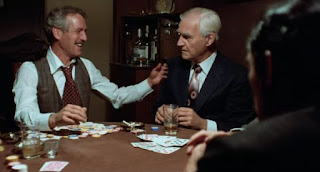
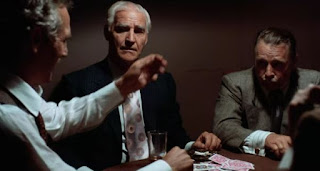













































































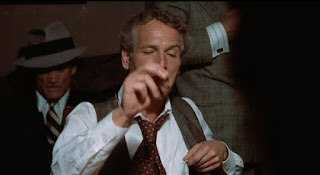
.jpg)



























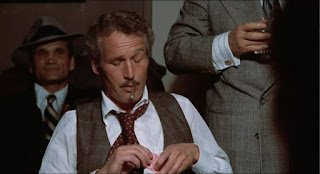











































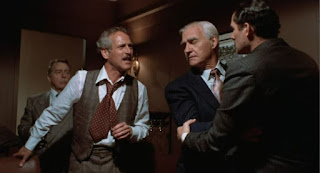








No comments:
Post a Comment